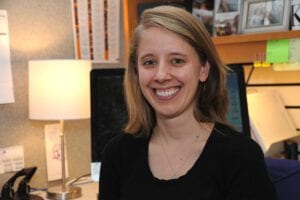
Posted By: Sarah Ratzel, PhD, Science Editor, AJHG
Each month, the editors of The American Journal of Human Genetics interview an author of a recently published paper. This month, we check in with Katie Lewis to discuss her paper, “Engagement and return of results preferences among a primarily African American genomic sequencing research cohort”.
AJHG: What caused you to start working on this project?
KL: Broadly speaking, we decided to recruit a study cohort comprised entirely of people who self-identified as African, African-American and Afro-Caribbean as an effort to address and research some of the issues related to the lack of racial diversity in our initial study cohort. When recruitment was complete, we began to think about how we would engage with participants in the study long term. This is a unique aspect of ClinSeq because participants consent to recontact over years, whereas most genomic sequencing studies are cross-sectional or anonymize sequence data. We realized we needed to understand more about the participants’ thoughts and preferences and conducted this series of focus groups.
AJHG: What about this paper most excites you?
KL: I love this paper because it’s focused on the participants’ perspectives. They were incredibly forthcoming, and we included many of their quotes so that other researchers could benefit from their insights as much as we did. One example of this was the participants’ dislike of using participant representatives. This was an option that our research group was strongly considering before the groups, but the participants’ reactions and rationale for them helped us realize that we would need to explore other modalities for engagement.
AJHG: Thinking about the bigger picture, what implications do you see from this work for the larger human genetics community?
KL: I hope this work can be part of improving genomic researchers’ willingness and abilities to recruit African American participants to their studies. The participants were insightful about what researchers can do in the face of historical and current injustices in medicine and research to build trust and bolster participation.
AJHG: What advice do you have for trainees/young scientists?
KL: My advice is particularly for genetic counselors: Consider a career in research and submit your work to the best journals and conferences you can! Genetic counselors have unique training and clinical experiences that are incredibly relevant to some of the most pressing research questions at the Forefront of Genomics. You can leverage your skills to develop impactful research projects and generate evidence to inform our practices.
AJHG: And for fun, tell us something about your life outside of the lab.
KL: As the mother of a three-year-old boy, I am a self-proclaimed expert in construction vehicles and all things LEGO.
Katie Lewis, Sc.M., C.G.C. is a genetic counselor in the Genomic Services Research Program at the NIH’s National Human Genome Research Institute.
